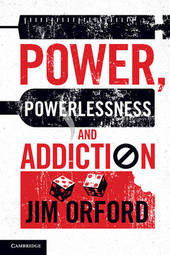
|
Power, Powerlessness and Addiction
Paperback / softback
Main Details
| Title |
Power, Powerlessness and Addiction
|
| Authors and Contributors |
By (author) Jim Orford
|
| Physical Properties |
| Format:Paperback / softback | | Pages:273 | | Dimensions(mm): Height 229,Width 152 |
|
| ISBN/Barcode |
9781107610095
|
| Classifications | Dewey:362.29 |
|---|
| Audience | | Professional & Vocational | |
|---|
| Illustrations |
Worked examples or Exercises
|
|
Publishing Details |
| Publisher |
Cambridge University Press
|
| Imprint |
Cambridge University Press
|
| Publication Date |
11 July 2013 |
| Publication Country |
United Kingdom
|
Description
Addiction exercises enormous power over all those who are touched by it. This book argues that power and powerlessness have been neglected in addiction studies and that they are a unifying theme that brings together different areas of research from the field including the disempowering nature of addiction; effects on family, community and the workplace; epidemiological and ethnographic work; studies of the legal and illegal supply; and theories of treatment and change. Examples of alcohol, drug and gambling addiction are used to discuss the evidence that addiction is most disempowering where social resources to resist it are weakest; the ways in which the dominant discourses about addictive behaviour encourage the attributing of responsibility for addiction to individuals and divert attention from the powerful who benefit from addiction; and the ways in which the voices of those whose interests are least well-served by addiction are silenced.
Author Biography
Jim Orford is Emeritus Professor of Clinical and Community Psychology at the University of Birmingham. Jim is a long-standing researcher and writer in the addiction field. Amongst his fourteen previous books are successful titles on addiction, notably Excessive Appetites: A Psychological View of Addictions (1st edition, 1985; 2nd edition, 2001), as well as others on community psychology including Community Psychology: Challenges, Controversies and Emerging Consensus (2008). He is one of the UK's leading addiction researchers and has an international reputation. In 2010 he was awarded the prestigious international E. M. Jellinek Award for his contribution to alcohol and addiction studies.
Reviews'This book brings together Jim Orford's vast knowledge of addiction research and theory and, using the unifying concept of power, it examines the multi-layered nature of how we are, at several levels, disempowered by our involvement with addictive consumptions. From the three case studies at the opening to his examples of communities reclaiming power at the end, his chapters move progressively from the individual, to families, to neighbourhoods and communities and onto the broader societal and industrial contexts that shape addictions in our lives. It is the first book on addiction I have read that thoroughly integrates so many important strands of thinking on this complex topic.' Peter J. Adams, Centre for Addiction Research, University of Auckland, and author of Fragmented Intimacy: Addiction in a Social World 'An important book with a powerful central message. Jim Orford masterfully weaves together wide-ranging and diverse fields of knowledge hitherto kept separate. The result is a fascinating exploration of the subtle but strong interconnections between addiction, powerless and power. Once again, Jim Orford breaks new ground.' Judith Harwin, Centre for Child and Youth Research, Brunel University 'This thought-provoking and beautifully written book delivers an important message for change on a broad canvas of integrated ideas: those most affected by addictions have been silenced and their voices need to be heard in the corridors of power.' Tim Stockwell, Director, Centre for Addictions Research of British Columbia, University of Victoria 'Both scholarly and accessible ... a potentially important contribution to our understanding of the social context of addiction.' The Times Higher Education Supplement 'Power, Powerlessness and Addiction is an important and challenging book. It will be especially interesting and useful for those working in substance use disorder prevention, diagnosis, treatment, and public policy. I will be returning to it in my teaching and scholarship.' Catherine Woodstock Striley, PsycCRITIQUES
|